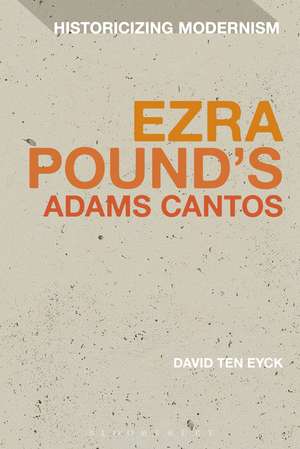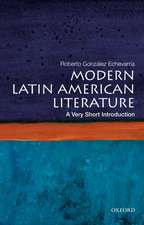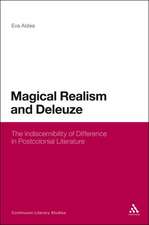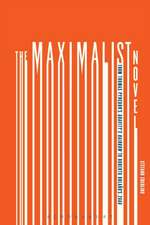Ezra Pound's Adams Cantos: Historicizing Modernism
Autor Dr David Ten Eycken Limba Engleză Hardback – 24 oct 2012
| Toate formatele și edițiile | Preț | Express |
|---|---|---|
| Paperback (1) | 257.12 lei 6-8 săpt. | |
| Bloomsbury Publishing – 23 apr 2014 | 257.12 lei 6-8 săpt. | |
| Hardback (1) | 773.81 lei 6-8 săpt. | |
| Bloomsbury Publishing – 24 oct 2012 | 773.81 lei 6-8 săpt. |
Din seria Historicizing Modernism
- 14%
 Preț: 540.31 lei
Preț: 540.31 lei - 30%
 Preț: 600.06 lei
Preț: 600.06 lei - 30%
 Preț: 602.11 lei
Preț: 602.11 lei -
 Preț: 447.39 lei
Preț: 447.39 lei - 30%
 Preț: 715.42 lei
Preț: 715.42 lei - 30%
 Preț: 509.93 lei
Preț: 509.93 lei - 13%
 Preț: 237.84 lei
Preț: 237.84 lei - 22%
 Preț: 259.07 lei
Preț: 259.07 lei - 13%
 Preț: 255.76 lei
Preț: 255.76 lei - 22%
 Preț: 777.06 lei
Preț: 777.06 lei - 22%
 Preț: 257.68 lei
Preț: 257.68 lei - 13%
 Preț: 257.97 lei
Preț: 257.97 lei - 13%
 Preț: 256.12 lei
Preț: 256.12 lei - 22%
 Preț: 258.59 lei
Preț: 258.59 lei - 13%
 Preț: 256.29 lei
Preț: 256.29 lei - 13%
 Preț: 258.42 lei
Preț: 258.42 lei - 30%
 Preț: 716.56 lei
Preț: 716.56 lei - 22%
 Preț: 232.34 lei
Preț: 232.34 lei - 22%
 Preț: 257.32 lei
Preț: 257.32 lei - 13%
 Preț: 228.85 lei
Preț: 228.85 lei - 30%
 Preț: 657.22 lei
Preț: 657.22 lei -
 Preț: 259.07 lei
Preț: 259.07 lei - 13%
 Preț: 258.42 lei
Preț: 258.42 lei - 22%
 Preț: 258.42 lei
Preț: 258.42 lei - 13%
 Preț: 257.03 lei
Preț: 257.03 lei - 30%
 Preț: 717.05 lei
Preț: 717.05 lei - 13%
 Preț: 256.20 lei
Preț: 256.20 lei - 22%
 Preț: 259.25 lei
Preț: 259.25 lei -
 Preț: 237.75 lei
Preț: 237.75 lei - 23%
 Preț: 236.27 lei
Preț: 236.27 lei - 13%
 Preț: 257.12 lei
Preț: 257.12 lei
Preț: 773.81 lei
Preț vechi: 1112.93 lei
-30% Nou
Puncte Express: 1161
Preț estimativ în valută:
148.07€ • 154.91$ • 123.00£
148.07€ • 154.91$ • 123.00£
Carte tipărită la comandă
Livrare economică 03-17 aprilie
Preluare comenzi: 021 569.72.76
Specificații
ISBN-13: 9781441100498
ISBN-10: 1441100490
Pagini: 208
Dimensiuni: 156 x 234 x 23 mm
Greutate: 0.52 kg
Ediția:New.
Editura: Bloomsbury Publishing
Colecția Bloomsbury Academic
Seria Historicizing Modernism
Locul publicării:London, United Kingdom
ISBN-10: 1441100490
Pagini: 208
Dimensiuni: 156 x 234 x 23 mm
Greutate: 0.52 kg
Ediția:New.
Editura: Bloomsbury Publishing
Colecția Bloomsbury Academic
Seria Historicizing Modernism
Locul publicării:London, United Kingdom
Caracteristici
Contextualizes poetry in the pre-war period and Pound's reading of 17th-century American History.
Notă biografică
David Ten Eyck teaches Modernism and poetry at the University of Lorraine, France. He is currently co-editing a new critical edition of Pound's Pisan Cantos and, in addition to his work on Pound he has written articles on 20th-century writers such as David Jones, James Joyce, John Berryman and Philip Larkin.
Cuprins
AcknowledgementsList of AbbreviationsNotes on the TextIntroduction: Ezra Pound's 'Adams Paideuma'1 The Genesis and Composition of the Adams Cantos2 'Including History': The Evolution of Ezra Pound's Documentary Method in the 1920s and 1930s3 Reading the Adams Cantos4 The Representation of History and Law in the Adams Cantos5 The Adams Cantos and Ezra Pound's Social Criticism of the 1930s and 1940s6 The Continuing Importance of the 'Adams Paideuma' in Ezra Pound's Late CantosAppendicesA A Selection of Pound's College Notes on Colonial and Revolutionary AmericaB Pound's 1931 Reading Notes for the Works of John AdamsC Tables of Reference in Pound's Copies of the Works of John AdamsD 'Confucio Totalitario' (1939)E Unpublished Material on John Adams and the American Revolution from the Thrones Poetry NotebookNotesBibliographyIndex
Recenzii
This illuminating study of Ezra Pound's Adams Cantos (62 to 71 of Pound's Cantos)offers a tour de force of careful literary-historical scholarship, adroit reading, and lucid explication. Ten Eyck gives one of the Cantos' least critically addressed and least favoured sections astute and sympathetic treatment, dispelling many misguided assumptions about The Adams Cantos and opening up fruitful avenues for appreciating both their hitherto unrecognized centrality to the Cantos as a whole and the importance of their poetic achievement more generally. Challenging the longstanding view that the Adams fall among the least poetically successful of the Cantos, Ten Eyck skillfully brings out the subtlety of Pound's poetic effects in this section. Helpful, too, is the light the book sheds on the evolution of what is now commonly termed Pound's "documentary method": Ten Eyck usefully complicates oversimplified received ideas about this approach through patient attention to materials related to the making of The Adams Cantos (often those that Ten Eyck has unearthed from archives), such as Pound's reading, notes and drafts, and engagement with and transformation of source texts. Even as he acknowledges ways in which Pound's approach often misleads and contributes to the distortion of historical facts, Ten Eyck makes a persuasive case for greater attention to these Cantos, given their pivotal role in Pound's magnum opus and thought more broadly-and offers astute guidance for readers seeking to understand Pound's distinctive poetics and convictions more closely and richly. This robustly researched book is a must for Pound scholars, and it can also be read profitably by those wishing to gain acquaintance with Pound's poetics in the Cantos and the main lines of Pound's middle years.
Focused on an under-discussed and difficult to understand group of Ezra Pound's Cantos, Ezra Pound's Adams Cantos delves into the archival and historical record of these poems to demonstrate their crucial role in Pound's endeavor to compose "a poem including history." Subtly engaged in Pound's larger literary and cultural project of the 1930s, Ten Eyck deftly brings readers afresh to these underappreciated poems, illuminating Pound's own reading of John Adams, his process of composition, and his development of "a documentary method" of poetic writing-one of the most radical elements of The Cantos. Ten Eyck's greatest contribution, however, is his convincing insistence that we engage these poems and their politics literarily, and his teaching us how to do so.
...David Ten Eyck offers a careful and lucid analysis of Pound's interest in John Adams, which crystallize in the 'Adams Cantos'. By giving us fine close readings, and by looking at these Cantos in the context of Pound's life and development of his political and social views, Ten Eyck successfully counters the general negative critical reception of this part of Pound's magnum opus, also in terms of its poetic quality. He convincingly demonstrates how Pound's use of the Adams material is a new development in his 'historical method' and in the textual evolution of the poem, making his study an indispensable tool for any reader of Pound's work.
David Ten Eyck's book provides an invaluable service to scholarship in its scrupulous adumbration of famously difficult modernist verse. Ezra Pound's Adams Cantos elaborates the "documentary method" at work in Pound's epic, tracing its development from the Malatesta Cantos of the 1920s to its fullest expression in the inscrutable poems dealing with the political thought and milieu of John Adams, composed swiftly in the lengthening European shadows of World War Two. Ten Eyck accomplishes a rare thing by showing how Pound's methods of citation transform from conventional (if dense) literary reference to what Peter Nicholls calls "an autonomous and continuous discourse." In doing so, Ten Eyck unlocks a hitherto oblique dimension of Pound's "poem containing history." The book is a lesson in How to Read: it performs a material hermeneutics carefully calibrated to a deep and judicious awareness of seemingly intransigent poetic materials and underlying documentary evidence. More than bringing the archive into the text - though surely the book does a deft job of this - Ezra Pound's Adams Cantos reinvigorates our understanding of Pound's own aspiration to write a poem that would function as a cultural repository, a textual place "where memory liveth.
The book is a model of scholarly attention, one that exhibits a variety of interpretative approaches without overriding commitment to any one in particular: close readings do not preclude explanations based on biographical evidence, nor does textual criticism disqualify the application of 'theory' . . . revealing and innovative original scholarship . . . Throughout, the author offers clear and convincing analysis of Pound's accompanying and not-unrelated ideological commitments.
Focused on an under-discussed and difficult to understand group of Ezra Pound's Cantos, Ezra Pound's Adams Cantos delves into the archival and historical record of these poems to demonstrate their crucial role in Pound's endeavor to compose "a poem including history." Subtly engaged in Pound's larger literary and cultural project of the 1930s, Ten Eyck deftly brings readers afresh to these underappreciated poems, illuminating Pound's own reading of John Adams, his process of composition, and his development of "a documentary method" of poetic writing-one of the most radical elements of The Cantos. Ten Eyck's greatest contribution, however, is his convincing insistence that we engage these poems and their politics literarily, and his teaching us how to do so.
...David Ten Eyck offers a careful and lucid analysis of Pound's interest in John Adams, which crystallize in the 'Adams Cantos'. By giving us fine close readings, and by looking at these Cantos in the context of Pound's life and development of his political and social views, Ten Eyck successfully counters the general negative critical reception of this part of Pound's magnum opus, also in terms of its poetic quality. He convincingly demonstrates how Pound's use of the Adams material is a new development in his 'historical method' and in the textual evolution of the poem, making his study an indispensable tool for any reader of Pound's work.
David Ten Eyck's book provides an invaluable service to scholarship in its scrupulous adumbration of famously difficult modernist verse. Ezra Pound's Adams Cantos elaborates the "documentary method" at work in Pound's epic, tracing its development from the Malatesta Cantos of the 1920s to its fullest expression in the inscrutable poems dealing with the political thought and milieu of John Adams, composed swiftly in the lengthening European shadows of World War Two. Ten Eyck accomplishes a rare thing by showing how Pound's methods of citation transform from conventional (if dense) literary reference to what Peter Nicholls calls "an autonomous and continuous discourse." In doing so, Ten Eyck unlocks a hitherto oblique dimension of Pound's "poem containing history." The book is a lesson in How to Read: it performs a material hermeneutics carefully calibrated to a deep and judicious awareness of seemingly intransigent poetic materials and underlying documentary evidence. More than bringing the archive into the text - though surely the book does a deft job of this - Ezra Pound's Adams Cantos reinvigorates our understanding of Pound's own aspiration to write a poem that would function as a cultural repository, a textual place "where memory liveth.
The book is a model of scholarly attention, one that exhibits a variety of interpretative approaches without overriding commitment to any one in particular: close readings do not preclude explanations based on biographical evidence, nor does textual criticism disqualify the application of 'theory' . . . revealing and innovative original scholarship . . . Throughout, the author offers clear and convincing analysis of Pound's accompanying and not-unrelated ideological commitments.

















